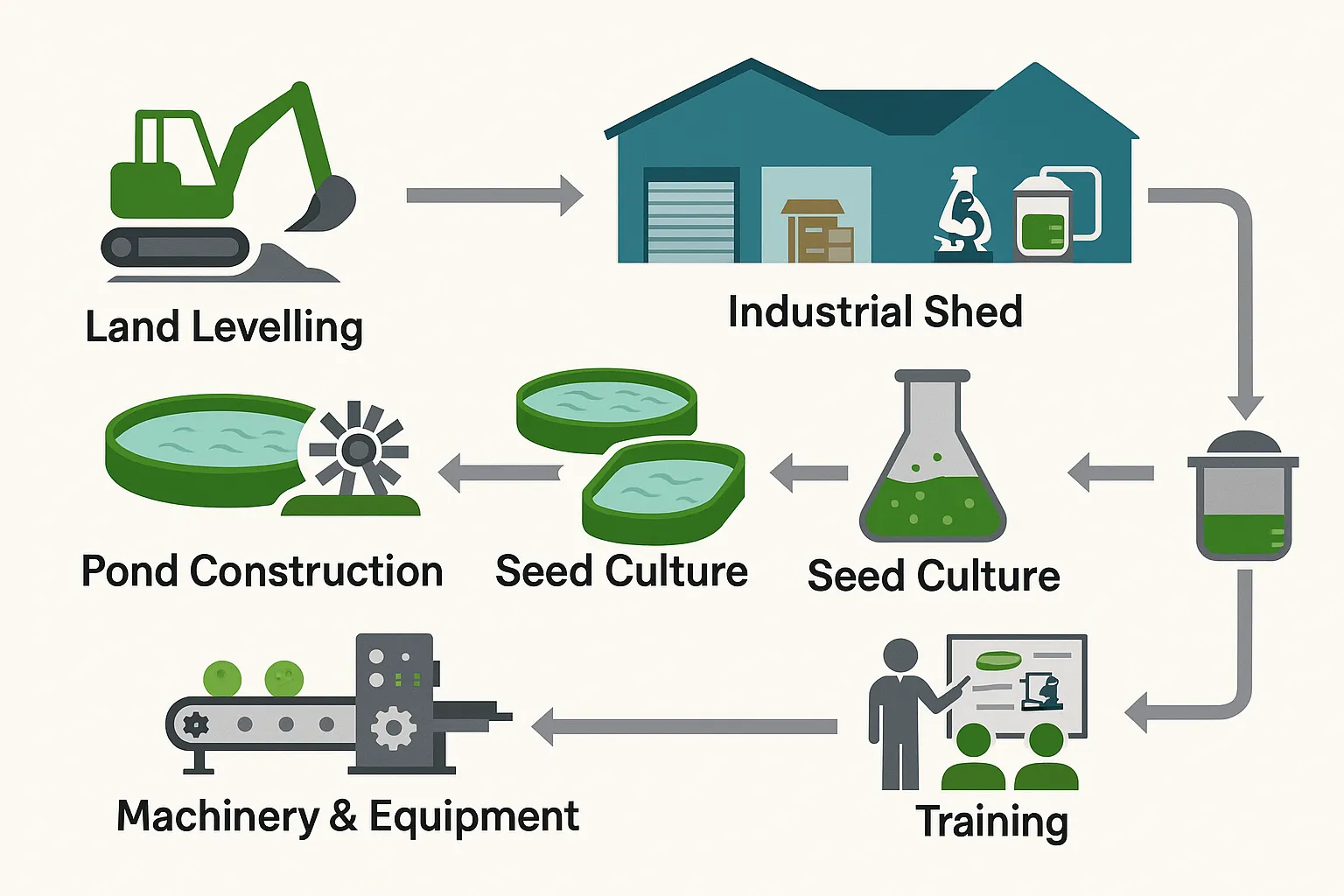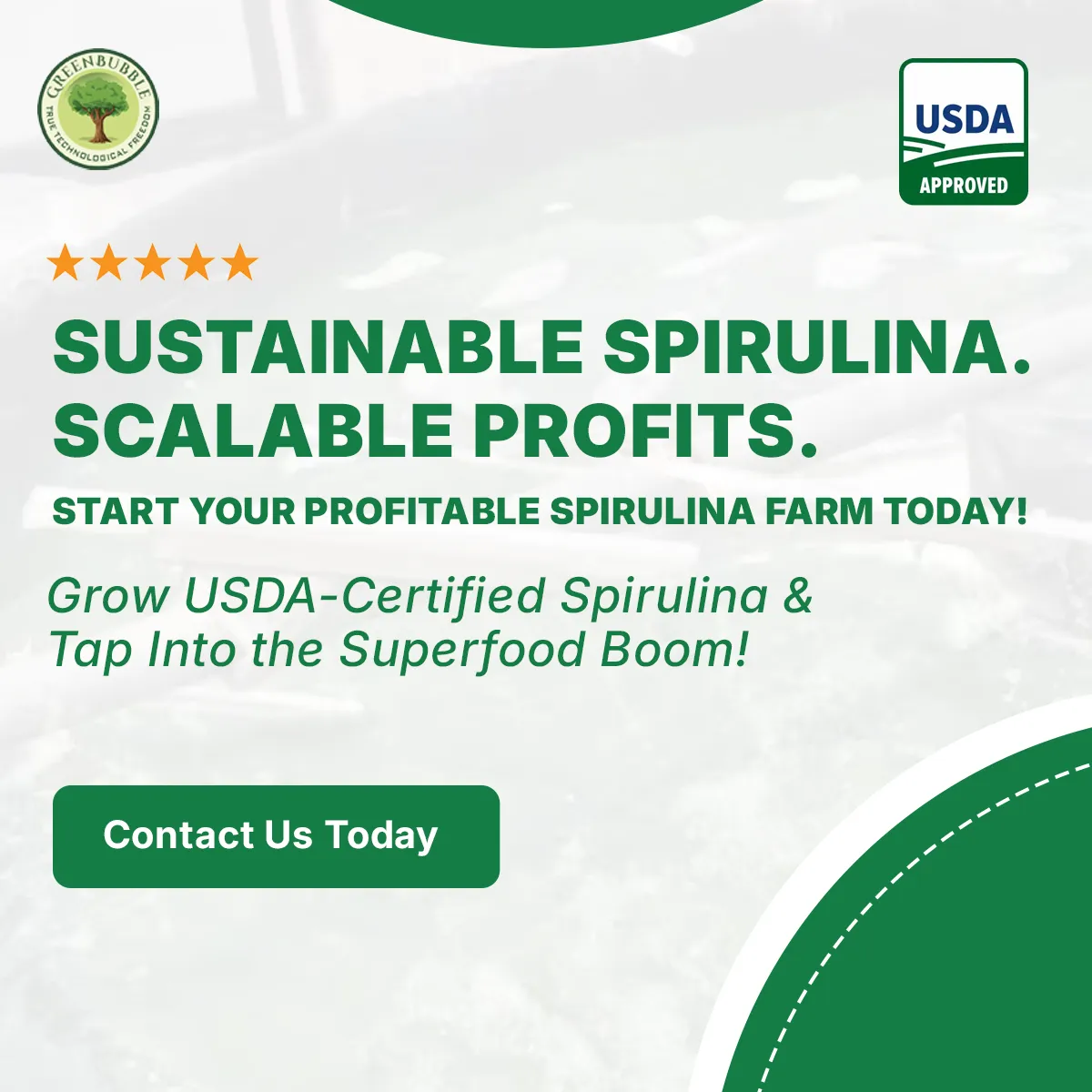Setting up a spirulina farm from scratch can be overwhelming—but with a turnkey solution, everything from design to documentation is streamlined. A spirulina turnkey project provides a ready-to-run commercial farm setup with integrated machinery, automation, traceability, and compliance systems.
Whether you’re a first-time investor or scaling to meet export demand, understanding each piece of the turnkey puzzle is essential. In this comprehensive guide, we break down every component that contributes to a high-performance, organic-compliant, and market-ready spirulina production facility.
1. Site Selection & Layout Planning
Success begins with a location that supports year-round spirulina growth.
- Climatic suitability: Temperatures of 30–40°C with stable humidity levels are ideal. The site must receive 8–10 hours of sunlight daily.
- Water source compatibility: Availability of borewell or surface water that can be purified through RO or sand filtration. Testing for heavy metals and TDS is essential.
- Soil and land analysis: Determines feasibility for construction, slope grading for drainage, and layout flow.
- Logistics: Access to power lines, transportation, and raw materials.
Layout planning includes:
- Aligned raceways for maximum sunlight
- Segregated zones for drying, cleanroom packaging, and labs
- Flow-optimized paths from pond to pack
- Sanitation pathways and emergency exits
2. Civil Infrastructure
Your spirulina farm must be built for durability, hygiene, and compliance.
- Raceway ponds: RCC or HDPE-lined with graded slopes and drain valves.
- Drainage system: Proper flow management to avoid stagnation or overflow contamination.
- Protective structures: Shade netting, mesh enclosures, or greenhouse roofs to prevent insect entry and regulate microclimate.
- Packaging/drying block: Includes concrete flooring with slope, SS drain channels, anti-slip finish, and UV-protected roofing.
- Power backup: Integration of solar PV panels, inverters, and diesel generators.
See raceway pond construction options
3. Machinery & Equipment Installation
A spirulina turnkey project provides precision-machined, food-grade equipment fully installed and tested.
Core systems include:
- Paddle wheel agitators: Driven by IP-rated motors and SS shafts
- Filtration systems: Modular filtration units with 80–120 mesh screens for removing dirt or debris.
- Harvesting system: CIP enables machines with 500 mesh drums to separate the spirulina from water.
- Dewatering setup: Vacuum filtration or belt press with minimal shear stress
- Dryers: RWD or vacuum dryers that preserve nutrient integrity and comply with organic guidelines
- Grinders & sieves: SS 316 ball mills or ACM with mesh options for uniformity
- Packaging equipment: Nitrogen flushing, heat sealing, and QR-label integration for traceability
Optional equipment:
- Capsule making machines
- Metal detectors and vibro sieves
- Blenders
- Cleaning-in-place (CIP) systems for sanitation
Learn about automated harvesting equipment
4. Automation & Monitoring
Modern spirulina farms rely on real-time data to ensure efficiency and quality.
- IoT Sensors: pH, temperature, light intensity, and turbidity tracking
- Automated dosing: Scheduled nutrient input and paddle wheel control
- SCADA integration: For centralized monitoring and reporting
- Cloud storage: Historical data archives used for audit trails and batch review
Benefits:
- Real-time alerts for deviations
- Optimization of culture cycles
- Prevention of over/underfeeding
5. Quality Control Systems
Turnkey farms include labs and SOPs to ensure you pass organic audits and COA standards.
- On-site lab setup: For live culture microscopy, microbial assessment, and pigment evaluation
- Sampling tools: Sterile pipettes, testing vials, logbooks
- Daily culture logs: Monitoring growth, density, and biomass performance
- Periodic testing: Heavy metals, E. coli, mold, yeast through partnered NABL labs
Lab results also assist in maintaining consistent protein and phycocyanin levels.
Review spirulina quality control guidelines
6. Certifications & Documentation Support
Turnkey projects include full guidance and support on:
Organic Certifications:
- Preparation of organic system plan (OSP)
- Inspection prep for USDA, EU, or India Organic
- Input approval sheets and feed documentation
Food & Facility Compliance:
- GMP layout design and SOPs
- HACCP plan (critical control points during harvesting and drying)
- Pest control protocols and sanitation checklists
- Training logs for staff
Documents provided:
- SOPs for each station
- Traceability forms
- Cleaning schedules
- Raw material intake and rejection logs
7. Packaging, Branding & Market Access
A product’s shelf appeal and compliance depend on how well it’s packaged.
Turnkey services may include:
- Packaging design consultation: Based on target markets (retail/export)
- Material selection: PET jars, foil pouches, glass bottles
- Printing integration: Labels with QR-code traceability and COA links
- Branding services: Logo design, product messaging, compliance marking
Some turnkey firms also offer:
- B2B buyer introductions
- White-label product placement
- E-commerce setup guidance
8. Staff Training & Handover
A world-class system fails without trained personnel. That’s why turnkey projects include:
- On-ground training for operators, lab staff, and QC team
- Training modules: SOP execution, audit response, hygiene practices
- Evaluation system and refresher training kits
- Troubleshooting guides and escalation charts
Most turnkey providers offer 30–90 days of post-installation support to stabilize your operations.
9. Traceability & SCADA Integration
An export-grade spirulina farm requires digital traceability.
- Track input dates, batch IDs, harvest times, operator credentials
- Record equipment run cycles, dryer logs, packaging line history
- Generate PDF audit reports for USDA or buyer review
- Integrate data with ERP or export documentation systems
QR-code enabled labeling linked to traceability boosts transparency and brand value.
10. Post-Handover Support & Expansion Planning
Once operations begin, turnkey vendors provide:
- Remote diagnostics for sensor faults or process errors
- Annual Maintenance Contracts (AMCs) for equipment
- Expansion modules to scale from 1 to 5 acres
- Audit mock sessions to prepare for renewal inspections
- Regulatory updates to keep SOPs current
Estimated Investment for a 1-Acre Turnkey Spirulina Farm
| Component | Estimated Cost (INR) |
| Civil construction | ₹15–18 Lakhs |
| Harvesting equipment | ₹10–12 Lakhs |
| Drying system (RWD/Vacuum) | ₹10–18 Lakhs |
| Packaging + cleanroom | ₹6–8 Lakhs |
| Automation (IoT/SCADA) | ₹3–5 Lakhs |
| Lab + QC setup | ₹5–6 Lakhs |
| Certification & documentation | ₹4–6 Lakhs |
| Total Investment | ₹55–70 Lakhs |
Expansion to 2–3 acres with integrated RWD drying, advanced analytics, and ERP systems may push investment to ₹1.5–2 crore.
Conclusion: Build Smarter with a Turnkey Spirulina Project
Spirulina turnkey projects are not just a shortcut—they are a launchpad for sustainable, compliant, and profitable farming. They consolidate best practices in construction, automation, quality control, and compliance into one seamless deployment.
If you’re looking to set up an export-grade farm or scale an existing pilot, choosing the right turnkey provider can cut down years of R&D and ensure your spirulina business is audit-ready from day one.
Explore our spirulina turnkey project solutions to start your certified spirulina journey with systems built for growth, trust, and long-term ROI.


